
Over the last few months, the Trump administration has moved to reduce the size of the federal government, substantially increase tariffs on imported goods from most countries, and end diversity, equity and inclusion (DEI) policies in the federal government.
- The public views all three of these actions more negatively than positively.
- Still, large majorities of Republicans say they approve of each.
Americans name a wide variety of actions when asked to describe what they like most and least about Trump’s second administration so far.
Immigration actions come up most frequently as the thing respondents like most about the administration (20% mention this), though 11% mention immigration actions as what they least like. Another 30% volunteer “nothing” when asked what they like most. And while Americans most often cite the way the administration is governing as what they like least (22%), tariffs (15%) and government cuts (11%) are also mentioned frequently.
Jump to Americans’ responses to our open-ended questions.
Cuts to federal departments and agencies
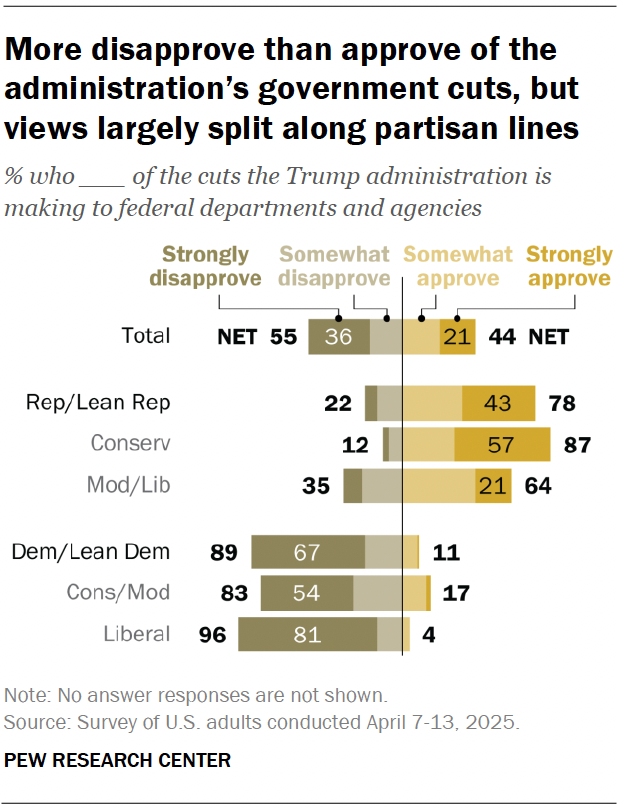
A 55% majority of Americans disapprove of the cuts that the Trump administration is making to federal departments and agencies, while 44% approve.
By a wide margin, Republicans approve of the administration’s cuts. By an even wider margin, Democrats disapprove:
- 78% of Republicans and Republican-leaning independents approve of these cuts.
- 89% of Democrats and Democratic leaners disapprove.
While views are largely split along partisan lines, 22% of Republicans disapprove of the administration’s government cuts – twice the share of Democrats who approve (11%).
Ideology
- Conservative Republicans are particularly likely to approve of the administration’s cuts to government (87%). This includes 57% who strongly approve.
- Moderate and liberal Republicans approve of the cuts by a narrower – though still nearly two-to-one – margin (64% approve, 35% disapprove).
- Nearly all liberal Democrats (96%) and a large majority of conservative and moderate Democrats (83%) disapprove of the administration’s cuts. But liberal Democrats are more likely to say they strongly disapprove (81% vs. 54%).
Effects of the federal government cuts
Have cuts to government been careless or careful?
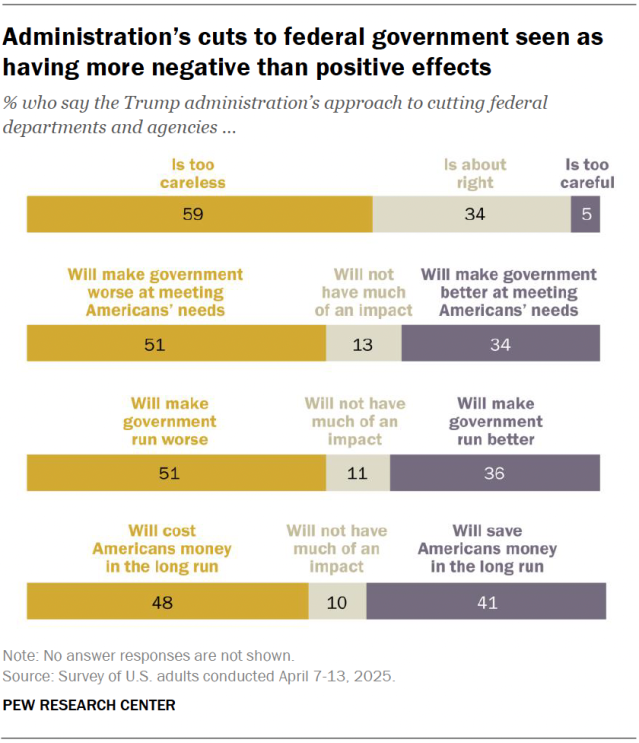
Views of the way the Trump administration has been making cuts to federal departments and agencies are more negative than positive: About six-in-ten (59%) say the administration has been “too careless” in making cuts. Fewer say its approach has been about right (34%) or “too careful” (5%).
Will cuts make government better or worse at meeting Americans’ needs?
About half (51%) say the cuts will make government worse at meeting Americans’ needs. Roughly a third (34%) say they will make government better at this.
Will cuts make government run better or worse?
Similarly, 51% say the cuts will make government run worse, while 36% say they will make it run better.
Will cuts save money or cost money?
And about half (48%) say the cuts will cost Americans money in the long run. About four-in-ten (41%) say they will save Americans money in the long run.
Partisans have different expectations about the impact of federal government cuts
Among Democrats
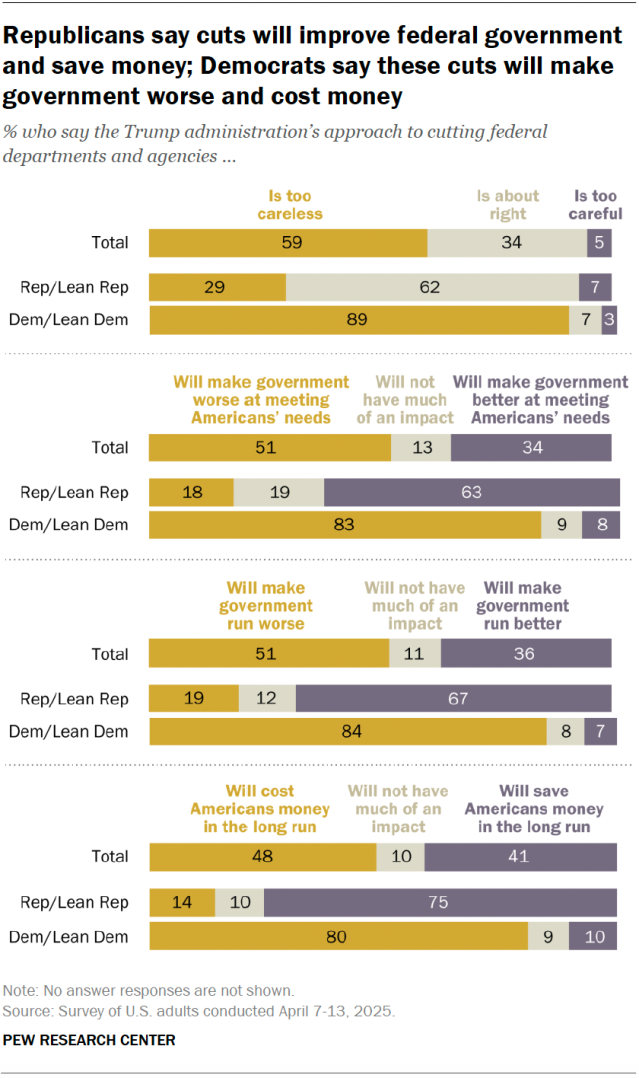
About nine-in-ten Democrats (89%) say the administration’s approach to cutting federal government has been too careless.
Eight-in-ten Democrats or more say the Trump administration’s approach will make government worse at meeting people’s needs (83%), make government run worse (84%), and cost Americans money in the long run (80%).
No more than one-in-ten say these cuts will improve how the federal government functions or save Americans money.
Among Republicans
Most Republicans are optimistic about the impact of the cuts. Six-in-ten or more say they will make the federal government better at meeting people’s needs (63%), make government run better (67%), and save Americans money in the long run (75%). Two-in-ten Republicans or fewer say the cuts will have negative effects in these areas.
About six-in-ten Republicans (62%) say the cuts have been handled about right, while 7% say the administration has been too careful. Roughly three-in-ten (29%) say the administration’s approach to cuts has been too careless.
Tariff increases
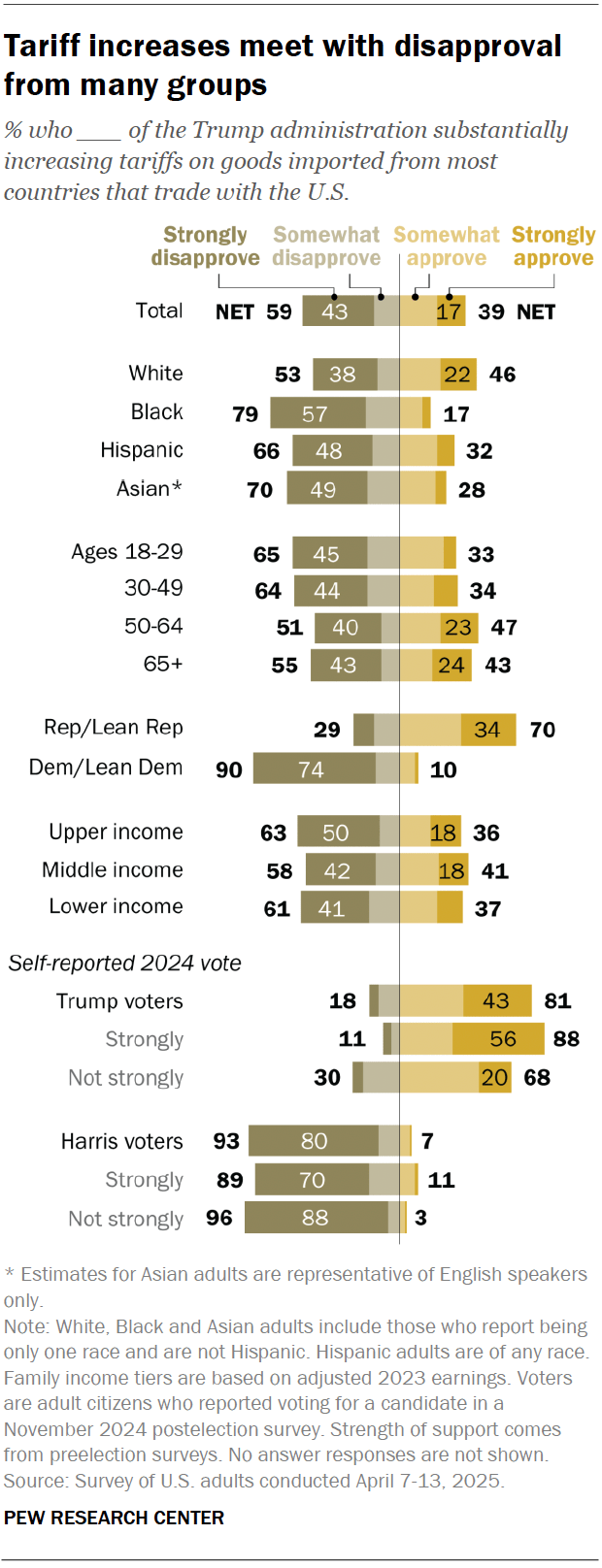
Nearly six-in-ten Americans (59%) disapprove of the Trump administration’s tariff increases on goods imported from most countries that trade with the U.S., including 43% who strongly disapprove. About four-in-ten (39%) approve of these increases, including 17% who strongly approve.
(The survey was in the field on April 9, when the administration announced a 90-day pause on some tariffs. There were no significant differences in views of the administration’s tariff actions when comparing interviews completed before and after the announcement.)
Political party
- Democrats overwhelmingly disapprove of the tariff increases: 90% disapprove, including 74% who strongly disapprove.
- 70% of Republicans approve, including 34% who strongly approve.
Race and ethnicity
- White adults are closely divided on the administration’s tariff actions, with 53% disapproving and 46% approving.
- By contrast, 79% of Black adults disapprove of the tariff increases, as do 70% of Asian adults and 66% of Hispanic adults.
Age
- Younger adults are less likely than older adults to approve of the administration’s tariff policy: 45% of those ages 50 and older approve, compared with 34% of adults under 50.
- This pattern holds among Republicans: 80% of Republicans ages 50 and older approve of the tariff increases, compared with 60% of Republicans ages 18 to 49. There are no age differences among Democrats.
Household income
- There are only modest differences in these views by income, with middle-income Americans (41%) slightly more likely to approve of the tariff increases than those living in lower-income (37%) or upper-income (36%) households.
Self-reported 2024 vote
Trump’s 2024 voters largely approve of the tariffs (81%), while those who voted for Democratic candidate Kamala Harris in 2024 overwhelmingly disapprove (93%).
Voters who strongly supported Trump in the 2024 election express more support – and much more intense support – for the administration’s tariff policy than those who supported him less strongly: 88% of his strong supporters approve of the tariffs, including 56% who strongly approve. Among Trump’s less enthusiastic supporters in 2024, 68% support the tariffs, and 20% do so strongly; 30% disapprove of the administration’s tariff increases.
Ending DEI policies in the federal government
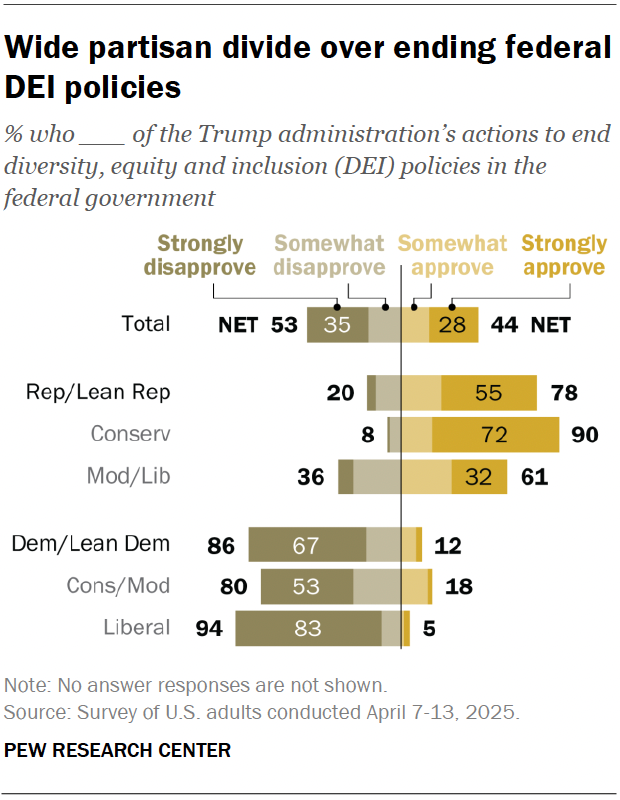
A narrow majority of the public (53%) disapproves of the Trump administration’s actions to end diversity, equity and inclusion (DEI) policies in the federal government, while 44% approve of these actions.
Nearly eight-in-ten Republicans (78%) approve of the efforts to end DEI practices in government, while 86% of Democrats disapprove.
Ideology
- Conservative Republicans are especially approving of ending DEI in government. Nine-in-ten approve, including 72% who strongly approve.
- By comparison, a narrower majority of moderate and liberal Republicans (61%) approve of these actions; 36% disapprove.
- There is widespread disapproval of Trump’s actions to end DEI in government among both liberal (94%) and conservative and moderate (80%) Democrats. However, these sentiments are particularly strong among liberal Democrats.
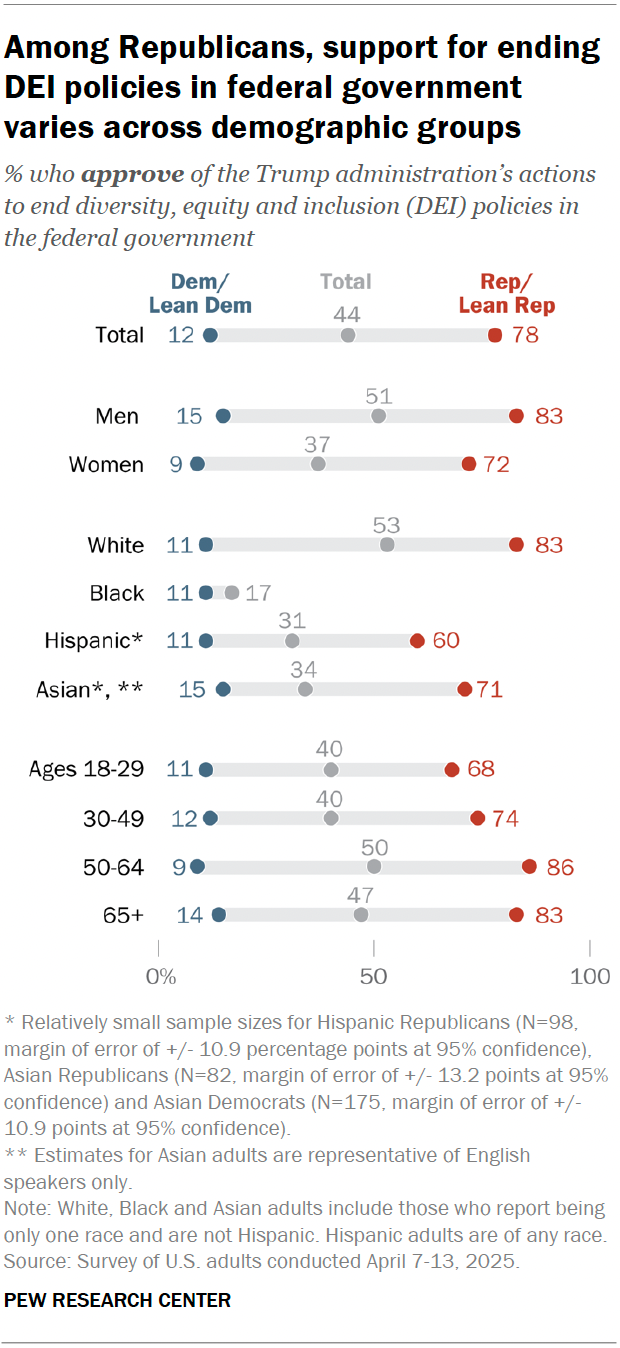
Demographic differences within partisan coalitions on ending federal DEI policies
While few Democrats across demographic groups approve of the Trump administration’s actions on DEI, there are notable differences in levels of approval among Republicans:
- Republican men are more likely to approve than Republican women (83% vs. 72%).
- 83% of White Republicans approve, compared with 71% of Asian Republicans and 60% of Hispanic Republicans.
- Older Republicans are more likely to approve than younger Republicans. More than eight-in-ten adults ages 50 and older (84%) approve, compared with 72% of GOP adults under 50.
In their own words: What Americans like most – and least – about the Trump administration’s actions so far
What they like most
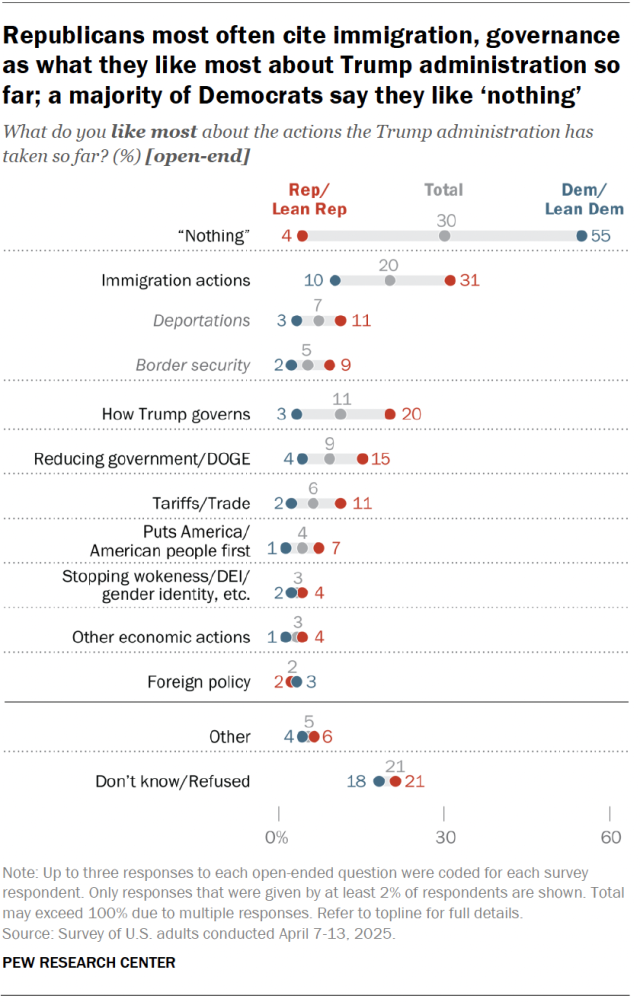
When Americans are asked to describe in their own words which of the Trump administration’s actions they like most so far, the most frequent response overall – and by far the top response among Democrats – is “nothing.”
Three-in-ten Americans, including a 55% majority of Democrats and Democratic-leaning independents, volunteer that they like nothing the administration has done so far.
By contrast, Republicans and Republican leaners point to several actions positively, including Trump’s approach to immigration and how he governs more generally.
Two-in-ten Americans, including 31% of Republicans and 10% of Democrats, say they like the administration’s immigration policies most.
Many of those who name immigration actions as something they like most specifically refer to policies on deporting immigrants who are in the U.S. illegally or who have committed crimes (7%), as well as efforts to make the border more secure (5%).
One woman in her 70s echoed many who cited the administration’s immigration actions in her response: “[Trump] has closed the border and is getting dangerous people off the streets and out of the country.”
Aside from specific policy actions, 11% of Americans say they most like how Trump is governing. A man in his 40s appreciates that Trump’s policies match his promises: “He’s doing exactly what he said he would do when he was campaigning.” Two-in-ten Republicans – but just 3% of Democrats – discuss the way Trump governs in their responses to this question.
About one-in-ten Americans (9%) also praise the administration’s efforts to reduce the size of government. A woman in her 30s said, “I like that they’re looking into where America is wasting money and cutting out those costs.”
The administration’s policies on tariffs and the economy are mentioned less frequently than its immigration policies or approach to governance. Fewer than one-in-ten adults (6%), including 11% of Republicans, point to Trump’s tariffs as what they like most. Just 3% of Americans (4% of Republicans) cite other economic actions taken by the administration.
What they like least
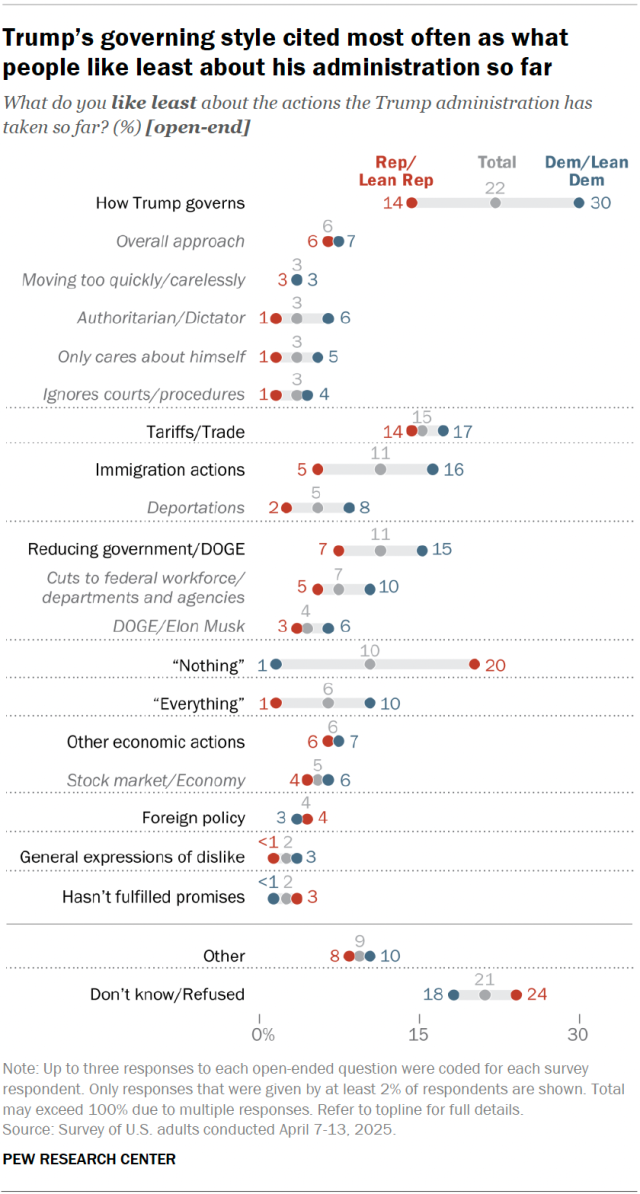
When it comes to what Americans like least about the actions the Trump administration has taken so far, more point to the way Trump governs than any specific policy domain.
Roughly two-in-ten Americans (22%) have negative things to say about how Trump governs, including 30% of Democrats and 14% of Republicans.
For example, even as some Americans praise Trump for moving quickly to implement his policies, others see this as a negative: “I believe he is trying to do too much too fast,” said one man in his 80s.
Criticisms of the way Trump governs range from his perceived carelessness (3%) to his choice of Cabinet and other officials (2%) to his attacks on institutions such as universities and law firms (2%). A similar share of Americans (3%) describe Trump as too authoritarian, with several of these respondents using the term “dictator.”
As for specific policies, 11% of adults – including 16% of Democrats and 5% of Republicans – say they least like the administration’s actions on immigration. In the words of one man in his 20s: “They are deporting people way too swiftly and now people who should never been deported are getting swept up.”
About one-in-ten adults (11%) say they least like the administration’s actions to reduce the size of government, with 15% of Democrats and 7% of Republicans naming this as their least-liked action. A small share (4%) specifically cite the work of Elon Musk or the “Department of Government Efficiency” (DOGE) team. Others, like one woman in her 30s, simply dislike that the federal government is “laying so many people off.”
One-in-ten Americans say there is “nothing” about the administration’s actions so far that they like the least. Republicans (20%) are far more likely to say this than Democrats (1%).
By contrast, 6% say they dislike “everything” the administration has done, with 10% of Democrats and 1% of Republicans saying this.




